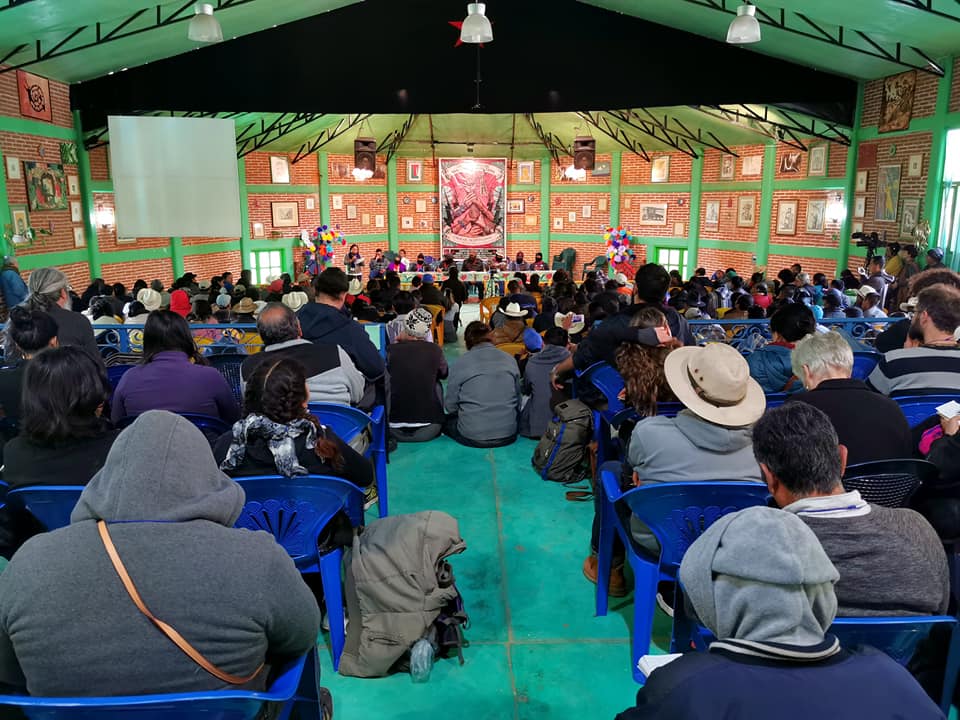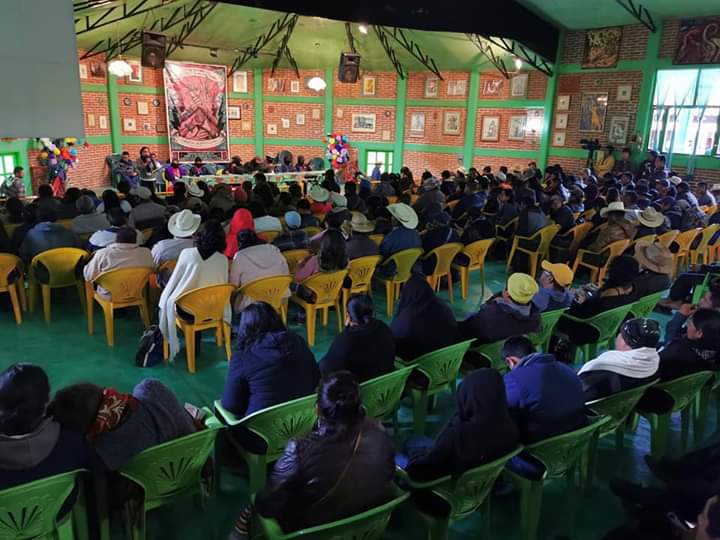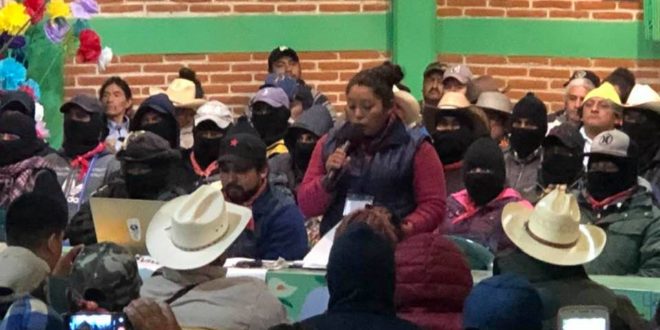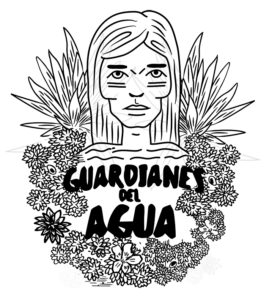COMISIÓN SEXTA DEL EZLN.
MÉXICO.
Diciembre del 2019.
Al Congreso Nacional Indígena-Concejo Indígena de Gobierno:
A las personas, grupos, colectivos y organizaciones de la Sexta nacional e internacional:
A las Redes de Resistencia y Rebeldía:
A quienes gustan de la Danza:
CONSIDERANDO QUE:
Primero y único:
BAILA UNA BALLENA.
La montaña iluminada. El eco del cine -no de una película, sino del cine como comunidad-, todavía deambula por entre ocotes encendidos, el azul nostálgico del caballo, Tulan Kaw, el guiño de luz de “bienvenid@s” y la luz desafiante de “ZAPATISTAS”.
Usted ha tratado de salir de aquí, pero, de alguna forma que no logra explicar, no puede… o no quiere. En la ya noche, siempre fría, usted recorre la planada donde, horas antes, la serpiente de las estaciones le traía recuerdos de ferias pueblerinas, lejanas en calendario y geografía.
Su mirada se detiene en los carteles del rompecabezas: “II Encuentro Internacional de Mujeres que Luchan”, “Foro en Defensa de la Madre Tierra”, “26 Aniversario”. “II Festival de Cine Puy Ta Cuxlejaltic”, “Primer Festival de Danza Báilate otro mundo”.
Una ráfaga de aire hace temblar el gran anuncio.
¿Se puede bailar el aire?
La danza, aparentemente tan lejana de todo, ¿puede trazar sólo con movimientos un sueño?
Sí, usted tal vez desvaría. Puede ser por el frío, o por esa irreverente estrella roja que cintila en la punta del cerro.
En eso está, cuando la niña y su pandilla llegan y le rodean con su bulla entusiasmada. “¡Va a haber baile!”, le gritan brincando. Bueno, la niña a quien llaman “La Calamidad” apenas levanta un poco los talones, pero su alegría es semejante a la de las demás. Lo del baile no entusiasma al Pedrito, el escéptico de la banda, y sentencia: “De por sí hay baile cada tanto, no veo la razón del escándalo”. Defensa Zapatista abre su método pedagógico con un zape y prosigue: “Va a haber baile pero colgado de una nube. O sea que no cualquiera”, y realiza un impecable movimiento de ron de jambe par terre en dehors. El gato-perro no quiere quedarse atrás y, obvio, se suma con un pas de chat.
“¡Va a haber baile!” repiten las niñas, no a coro porque son bastante disparejas.
Una insurgenta (usted la identifica por su uniforme) llega corriendo y dice: “¡Calamidad, veníte, que lo van a bailar la ballena!”. La Calamidad sube a toda velocidad -que tampoco es mucha que digamos-, la ligera cuesta que lleva a las entrañas de la ballena de madera aún reposando… o recuperándose de las heridas de arpones, mentiras y olvidos. Defensa Zapatista carga al gato-perro en brazos y le sigue.
La Esperanza Zapatista se queda discutiendo con el Pedrito, quien señala que no sólo es imposible bailar una ballena, también que es imposible que se encuentre un cetáceo (así dice) en medio de las montañas del sureste mexicano. Usted no se entera del final de la discusión, aunque supone su desenlace –Esperanza, aunque le llega a la cintura al Pedrito, suele terminar cualquier discusión con un “hombres, no ven más allá de sus narices… y son chatos”-.
Usted decide seguir a Defensa Zapatista, al gato-perro y a la Calamidad. Le siguen la Esperanza Zapatista y un Pedrito rezongando porque tiene hambre.
Se adentran en las entrañas, ahora casi vacías, del gigantesco animal. Un grupo de danzarines practica sus movimientos. Ellas, elloas y ellos recorren el templete que, contradiciendo su vocación, no está más elevado que las plateas, sino más bajo.
Usted se sienta y, más que mirar los ejercicios y pasos ensayados, pone atención en la reacción de la pandilla. La Calamidad, inspirada, se ha subido a una de las bancas e intenta un echappe simple y, al caer sobre la tabla, ésta se rinde (la tabla, se entiende). “¡Calamidad!”, le grita Defensa Zapatista. Pero la Calamidad ya se subió en otra banca y repite el paso… y la tabla rota. A la quinta banca quebrada, un pelotón de milicianas trata de sujetar, inútilmente, a una Calamidad que se reitera en su intento de desafiar la ley de gravedad… y de la lógica.
El escándalo que sigue –la Calamidad brincando de una banca a otra con una agilidad fuera de los límites de su cuerpo, las milicianas tratando de rodearla y someterla, el gato-perro mordiendo a las milicianas, la Defensa Zapatista tratando de detener al gato-perro, la Esperanza sacando su celular para video grabar el tumulto, el Pedrito recordándoles a todos que tal vez es mejor comer algo-, no parece perturbar a quienes se cuelgan de un viento que, debido a la ausencia de música, sólo sopla en sus corazones.
¿Se puede bailar una ballena herida?
“Ah, los zapatistas, siempre como que están viendo otra película”, piensa usted para sí. Como si cuando hablaran del mundo, no se refirieran a éste que se padece. Como si, en una nave espacial, eligieran mirar, no el mundo que queda detrás, sino el que se esconde en algún lugar del universo… o de su imaginación.
¿Se puede imaginar la banda sonora de un mundo nuevo que, insumiso, surge de los escombros de otro que ya cruje imperceptiblemente?
Entonces usted entiende… o cree entender. Con lo de “Báilate otro mundo”, el zapatismo no está lanzando un desafío, sino una invitación.
Mientras tanto, acorralada en el último rincón del auditorio, la Calamidad ha detenido el ataque de las milicianas, quienes escuchan, atentas, cómo la niña les explica el “juego de las palomitas” y les cuenta “la historia del maíz palomero versión Calamidad”.
Entonces, usted siente un pequeño temblor bajo sus pies. Duda. Certifica. Sí, parece que la ballena al fin se despereza y se dispone a retomar su camino loma arriba.
Como si la danza, el arte de bailar otro mundo, le hubiera aliviado las heridas y el corazón, y le animara a seguir su absurdo empeño.
Pero eso es imposible. ¿O no?
-*-
Con base a lo anteriormente expuesto, la Comisión Sexta del EZLN, invita a los hombres, mujeres, otroas, niños y ancianos de la Sexta, del CNI y de las redes de Resistencia y Rebeldía en todo el mundo, y también a quienes puedan y quieran, al PRIMER FESTIVAL DE DANZA…
(Continuar leyendo…)









